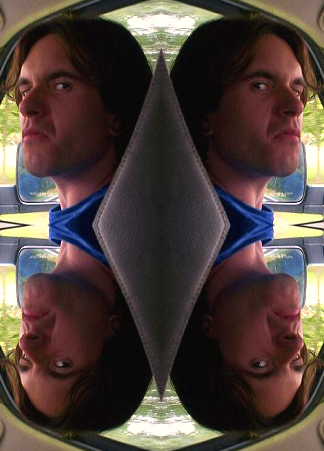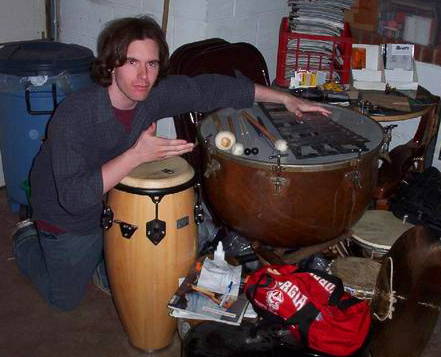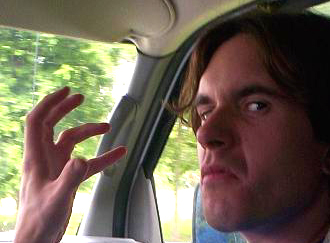

Hunter Ginn plays the skins and is one of the driving forces behind metal prog innovators Canvas Solaris. Nathan Sapp on guitars & keys, and Ben Simpkins on basses and guitars round out the trio. Their latest release, Cortical Tectonics (on Sensory / Laser's Edge) is a powerful document of a trio kicking your ass into the next zip code! Progsheet took high tea with Ginn and here's what transpired...
PS: What's the first album you remember buying, and what drew you to it?
HG: There were earlier albums, to be sure, but I have the most distinct memory of buying Sepultura's Arise. I loved the menacing, spiky logo and the cryptic color scheme/artwork for one, but it was the ecstatic recommendation of the store clerk that pushed me over the edge. Arise, along with Entombed's Left Hand Path paved the way for my descent into the maelstrom, as it were. In some ways, I have to think that the Entombed record had a more sustained impact, at least in terms of my own listening. The direness and opacity of that first album still demands investigation, not unlike early works by Beherit and Nuclear Death. I love music that resists and disappoints the ear's expectations, and Entombed's early music-all lacerating buzz saw guitar tones and cave-reverb drums-does just that. That I still find that music so thrilling speaks volumes about its quality and complexity, I think.
PS: How did you meet Ben & Nathan?
HG: I met Nathan first in 1995, through our first bass player, Jimmy McCall. I remember him being painfully shy and wearing a Morbid Angel shirt, which impressed me deeply! I mean, after all, this was South Georgia, and it was always difficult to find kindred metal spirits in such a cultural vacuum. We talked briefly about some common interests and then he left. I don't believe I saw him again for at least two or three years, at which point he'd begun playing guitar in the area's most popular heavy band, Publikohn. Their sound-a math-conscious mix of early Helmet and Don Caballero-appealed to Nate on some levels, but didn't satisfy him totally. At their final show in April 1999, while talking about Cynic and Skinny Puppy, we made early plans to begin jamming. This finally happened in June 1999, and we were just thrilled with the immediate chemistry. So, it all began there, some 8 years ago. Where'd the time go?
I met Ben a bit later-in September 1999-when he auditioned for my other band at the time. We played a contemporary mark-up of 70s heavy-beat sound: James Gang, Free, Sabbath, Bang, Humble Pie, Sir Lord Baltimore. However, Ben held a real passion for the acute, progressive ends of metal, as well as for mid-period Rush, King Crimson, and Gabriel-era Genesis. When I first heard him play guitar in Feb. 2002, I knew immediately that he should join Canvas as a second guitar player. At the time, we were still functioning as a four-piece death metal group, but in March 2002, when Nathan and I decided to take the plunge into instrumental territories, we mandated that Ben come along. His skill, quirkiness, and wild musical imagination were apparent from the very beginning. When he first brought in Cyclotron Emission, for instance, Nate and I were horrified. Oh, the ending of that song! We still miss him dearly.
PS: What is the best aspect of being part of a band as opposed to being, say, a solo artist?
HG: Since I've never been a solo artist, this answer will probably involve a lot of conjecture on my part! What I love most about the band situation is the camaraderie and the friendship. It means a lot to share something so powerful as music with people you love, especially those with whom you have long personal histories. For me, that's the most fundamentally rewarding aspect of group playing. More practically, I need the extra/outside perspective that comes from having 5 cooks in the kitchen, so to speak. Not only are we all able to preempt/correct each others' bad ideas, but a lot of our best pieces have come out of the collaborative/synergistic group environment. Nathan and I have been playing with each other for so long now that we can virtually finish each others musical sentences. We've actually written huge passages of music in real time! It's a great blessing to find someone with whom your own musical ideas are so compatible. At this point in my life, I can't imagine playing with anyone else.

